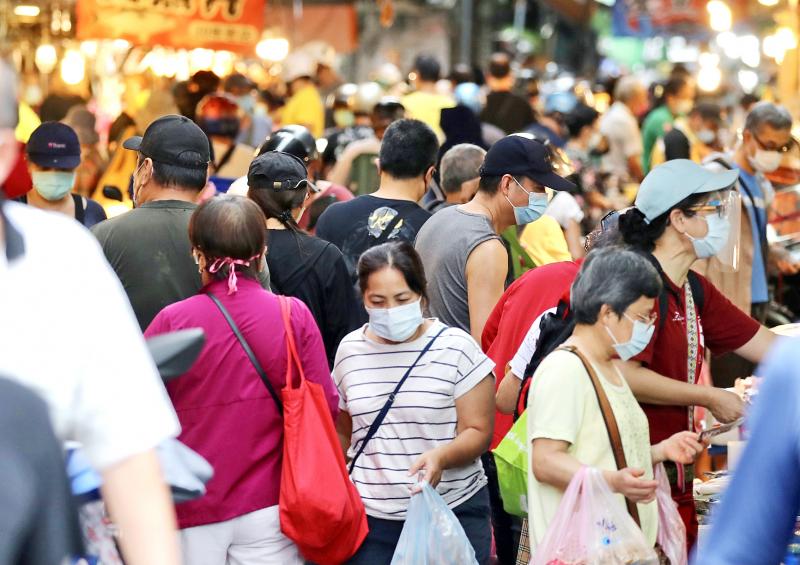The Central Epidemic Command Center (CECC) yesterday reported 476 locally transmitted COVID-19 cases, 35 backlogged cases and 37 deaths.
Minister of Health and Welfare Chen Shih-chung (陳時中), who heads the center, said that most of the total of 511 cases live in New Taipei City, with 229 cases, followed by Taipei with 144, Miaoli County with 66, Taoyuan with 16, Keelung with 13 and Changhua County with 11.
Taichung reported nine new cases; Hsinchu County seven; Pingtung County four; Kaohsiung as well as Nantou and Chiayi counties reported three each; and Hsinchu City, Yunlin County and Tainan reported one new case each.
The 37 dead are 25 men and 12 women, who were aged from their 30s to their 90s, Chen said.
It was the highest daily COVID-19 death toll in Taiwan, where 224 people have died of the disease since the pandemic began.
Centers for Disease Control (CDC) Director-General Chou Jih-haw (周志浩), head of the CECC’s disease surveillance division, said one of the deceased was a man in his 30s who lived in a high-infection risk area in Taipei. The man had been hospitalized since the middle of last month and died on Tuesday.
He did not mention underlying health conditions, Chou said.
CDC Deputy Director-General Philip Lo (羅一鈞), deputy chief of the center’s medical response division, said an analysis on all the COVID-19 fatalities as of Friday showed that 89.1 percent were aged 60 or above, with an average age of 72.
Among the dead, 81.7 percent had underlying health conditions, and the average time between the onset of symptoms and death was 8.3 days, he said.
The increase in deaths in the past few days reflects the peak in case counts in the middle of last month, when elderly people accounted for the largest proportion of confirmed cases, some of whom later developed severe symptoms and died, he said.
Among the 9,368 cases confirmed since April 20, 1,659 people, or 17.7 percent, developed severe pneumonia or acute respiratory distress syndrome, he said.
Among the 3,471 confirmed cases aged 60 or above, the figure is higher at 1,155 people, or 33.3 percent, he added.
Chen said that the center yesterday morning held an online session to improve the quality of care for severe COVID-19 patients, including a talk on the clinical treatment of severe cases by National Taiwan University Hospital (NTUH) Hsinchu Branch superintendent Yu Chung-jen (余忠仁), and a talk on care practices in COVID-19 intensive care units (ICU) by NTUH isolation ICU division director Ruan Sheng-yuan (阮聖元).
The session was attended by about 3,900 healthcare professionals, he said.
Lo said that if a person with severe COVID-19 develops a critical and irreversible condition, their physician may discuss the option of a do-not-resuscitate order with the patient’s family, but it is not the general guideline.
There are five main guidelines for treating people with severe COVID-19: non-invasive respiratory support through high-flow nasal cannula therapy or mask; endotracheal intubation; the use of antiviral medication remdesivir; the use of monoclonal antibodies and steroids; and the use of anticoagulants in patients with high risk of blood clotting.
The participants in the online session raised concerns about silent hypoxia in people with mild symptoms, as they do not experience any breathing difficulty, but might experience a sudden and rapid drop in blood oxygen level, leading to a high risk of death, Lo said.
The CECC and local governments have tried to move all of the people hospitalized with COVID-19 to quarantine facilities where healthcare professionals can monitor their conditions, he said.
Chen said the mortality rate of COVID-19 in Taiwan has increased from more than 1 percent to about 2 percent yesterday.
Asked if the center would raise the COVID-19 alert to level 4, meaning a nationwide lockdown, to prevent the virus from spreading further, Chen said the outbreak situation needs to be further observed, adding that the CECC specialist advisory panel has not recommended such a step.
Separately, sources said the CECC has reported to the Executive Yuan that it is considering extending the level 3 alert for two more weeks, until June 28.
The Cabinet has asked the Ministry of Education to make preparations for extending the suspension of classes in case the level 3 measures are extended, as parents would need to be informed in advance, sources added.
Additional reporting by Lee Hsin-fang
Source: Taipei Times - 2021/06/06





















